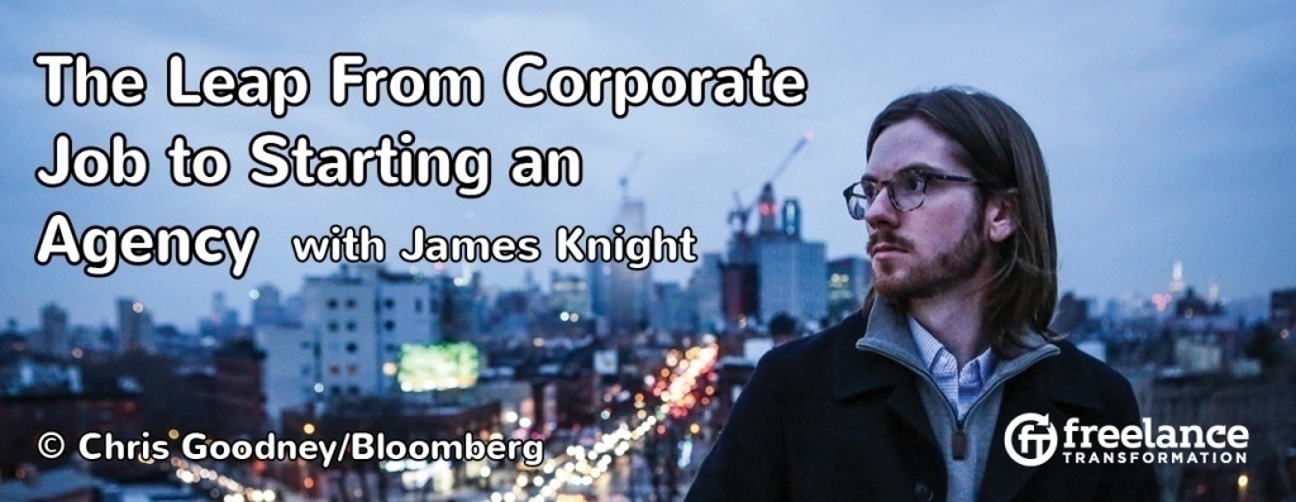
FT057: The Leap From Corporate Job to Starting an Agency with James Knight
James Knight had the cushy corporate job, at Google no less. He did great work and was well taken care of. Yet two years in he left to become a freelancer and ultimately started building an agency, Gradient. Why did he do this? And how did he pull off this transition that many people daydream about, but are terrified to go through with?
James will take us through this journey, and the practical details such as how he found his first few clients, the decision to go further from freelancer to agency, taking on a business partner, and the lessons he’s learned along the way.
Listen now:
Listen on iTunes Listen on Stitcher
Podcast RSS Feed | Download MP3
James shares with us:
- Why James decided to start freelancing: Freelancing gave James the opportunity to create the job that he wants, a job that allows him to perform a diversity of tasks and a job where his performance is proportionally compensated by completing high-paying client work. At his corporate job, it didn’t matter if he delivered millions of dollars in a quarter or nothing at all, he would get paid the same. Freelancing makes the work feel very real with consequences if it doesn’t get done and rewards if you do it well.
- How to make the leap to freelancing: James recommends getting your feet wet before taking the plunge. This means trying out freelancing after work and on evenings and lining up clients before quitting your day job. That way, you can save up some money as a safety net when you set out on your own and it is a little less scary.
- How to start finding clients: James reached out directly to agencies and offered his services. He also kept a close eye on the posts on Hacker News, “Who is hiring?” and “Freelancer? Seeking freelancer?”, to snag engagements. He also worked with 10x Management who connected him with clients. For ongoing client acquisition, James’s company is shifting towards more content marketing through his newsletter so his company doesn’t have to rely on job boards. That said, he is also going to try out AngleList, which connects investors with companies.
- How to write a proposal: Initially, James thought that making a long, detailed proposal would make him look more professional. He spent a lot of time essentially writing essays for the proposal that the prospective client never read. Now, his proposals are short, to the point, have extra whitespace, and are much more successful. His proposals now consist of the work he will do for the client, how long it will take, how much it costs, and relevant examples of past work to prove that he knows his stuff. In general, James learned that if her were to start over, he wouldn’t spend so much time on the things that aren’t actually doing the work, like designing a logo or coming up with a name. Just start working!
- Why James chose to partner: A good partner is someone who shares similar goals, but also disagrees on how to get there to promote discussion and open you up to new ways of problem solving. Good partners catch each other’s mistakes, look at problems from different angles, and overall reduce risk in the company. But we have all heard of stories of partnerships turning bitter and leading to the break up of the company. James suggests two things: constant communication and signing a contract up front to agree on business operations and limits on what each partner can do in the business.
Resources Mentioned:
- How to Win Friends and Influence People by Dale Carnegie
- The Lean Startup: How Today's Entrepreneurs Use Continuous Innovation to Create Radically Successful Businesses by Eric Ries
- Hacker News: “Who is hiring?” and “Freelancer? Seeking freelancer?”
- 10x Management
- AngleList
Find James Online:
- Email: james@gradient.nyc
- Sign up for the newsletter: gradient.nyc
- Bloomberg article featuring James
Share your thoughts and feedback below: